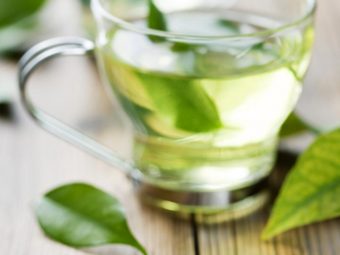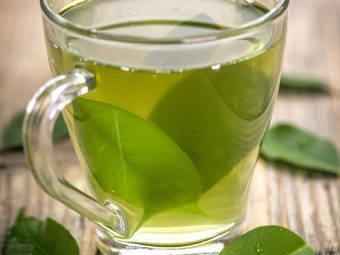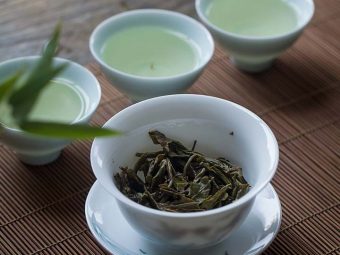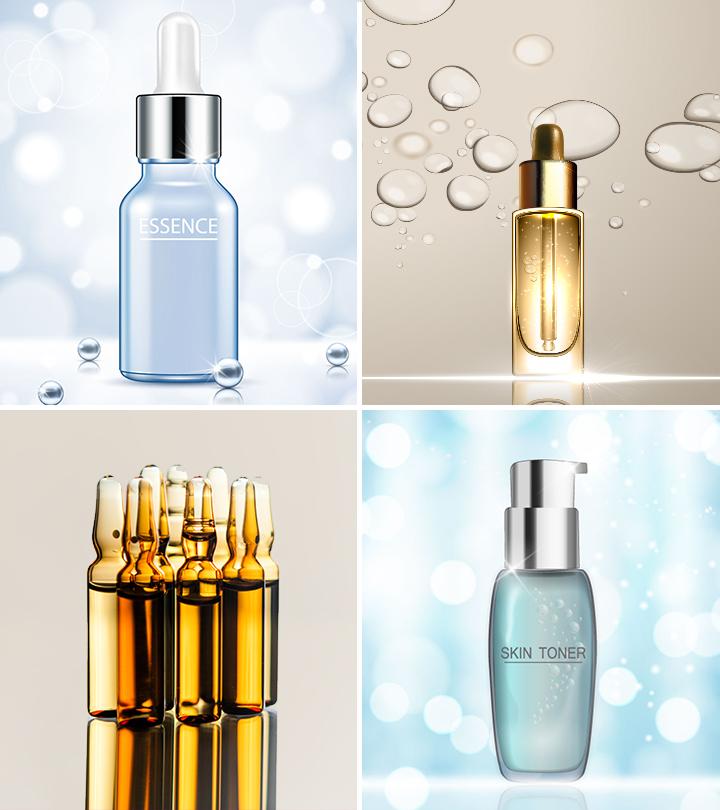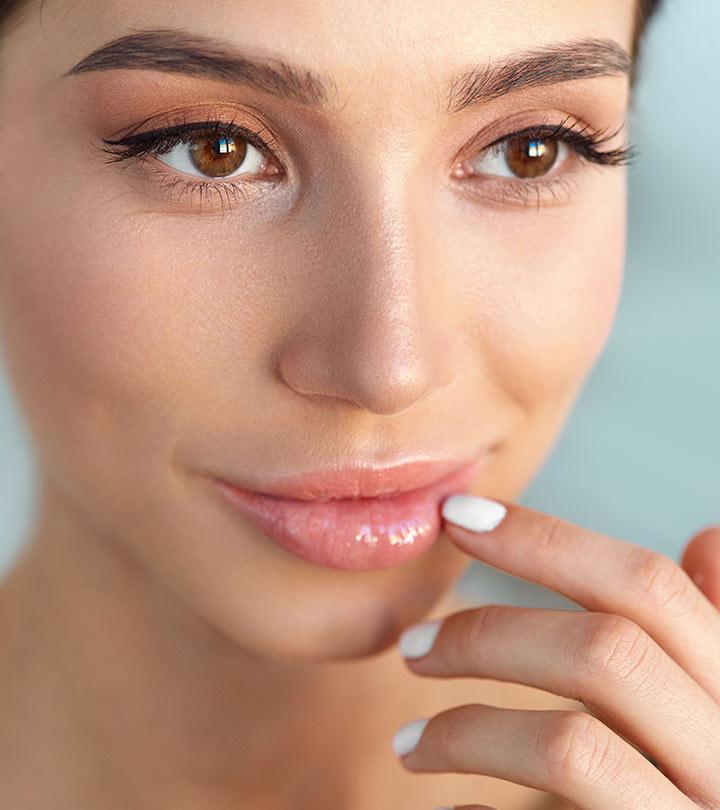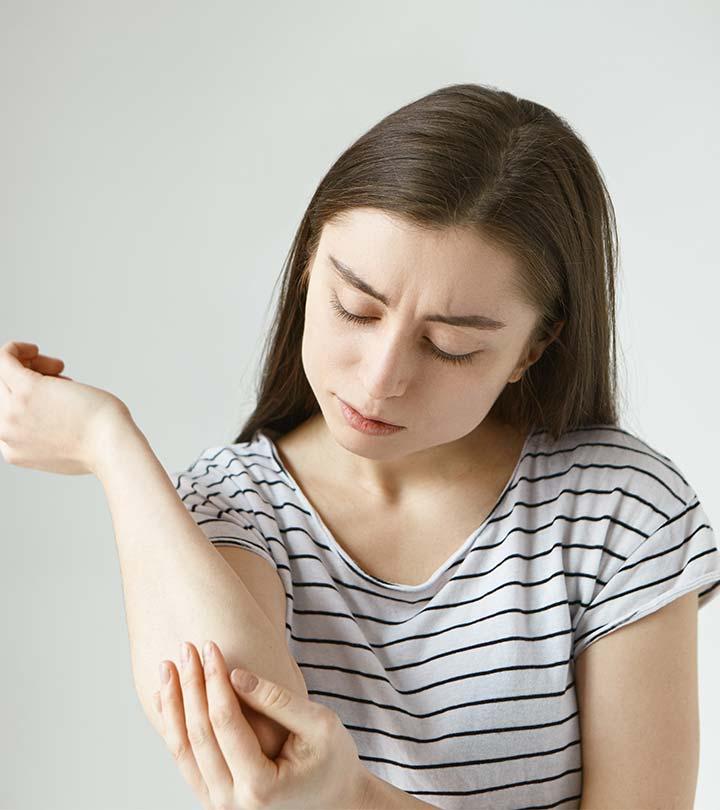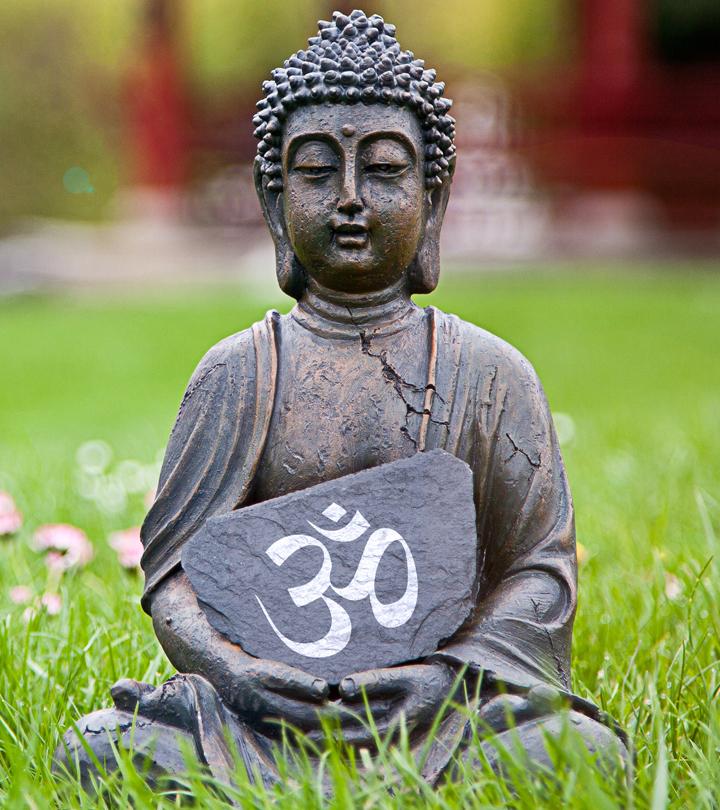5 Scientific Reasons Green Tea Is Good For Your Skin

Image: Shutterstock
Is your skin overexposed to dust, pollution, and harsh UV rays? Has it become lifeless, patchy, full of dark spots, acne, or wrinkles, and too oily or too dry to touch? Certainly, your skin needs help.
Enter green tea – the potential one-stop solution to most skin problems. It is obtained from the plant Camellia sinensis. Green tea antioxidants and polyphenols can protect the skin and help retain its youth (1). Keep reading to know 5 reasons green tea is good for your skin, how to use, and 8 best green tea skin care products you can buy. Scroll down!
In This Article
How Green Tea May Benefit Your Skin
1. Green Tea Can Help Manage Acne
Acne is a common problem among teenagers and adults. It occurs due to clogged pores, hormonal imbalance, excessive sebum production, bacterial infection, and inflammation around the sebaceous gland follicles (2).
Topical application of green tea for two weeks was effective in reducing sebum production and inflammation in the follicles (2), (3). Ingestion of decaffeinated green tea extract (GTE) also showed promising results with decreased number of acne lesion counts (4), (5).
However, more research is required to determine the clinical benefits of decaffeinated GTE in women with post-adolescent acne, and it should be tested against standard treatments to compare the results in unhealthy states.
2. Green Tea Polyphenols Protect The Skin From UV Rays
Repeated and prolonged exposure to the sun’s harmful UV rays causes photoaging (6). EGCG, the green tea polyphenol, can help protect the skin from UVB rays and inhibit UVB-induced protein oxidation. This, in turn, can help prevent skin aging (7).
The topical application of green tea helps scavenge harmful free oxygen radicals produced due to UV exposure (8). Green tea may also help reduce skin pigmentation, but more research is needed to establish this (9).
3. Green Tea May Reduce The Risk Of UVB-Induced Skin Cancer
According to the American Academy of Dermatology, approximately 9,500 people in the U.S. are diagnosed with skin cancer every day (10). Harmful UV rays, chemicals, and toxins that affect the DNA are responsible for the growing number of people with skin cancer (11).
EGCG offers cancer-preventive effects and can help suppress tumor growth (12). A study showed that the polyphenols in green tea could be used as pharmacological agents to prevent solar UVB light-induced skin disorders like melanoma and nonmelanoma skin cancers and photoaging (13). Many other studies have concluded that regular consumption of green tea may help reduce the risk of skin cancer in mice and humans (14), (15). However, more research on human subjects is required.
4. Green Tea Antioxidants Can Help Manage Skin Aging And Wrinkles
Our skin starts to wrinkle as we age. The collagen and elastin fibers in the skin make it look plump and smooth. But with age, these break down, causing the skin to fold and droop. Scientists found that green tea water extract reduced skin damage, promoted anti-wrinkling processes, and delayed collagen aging in mice (16), (17). Tannase treatment was found to improve green tea’s antioxidant activity, thereby reducing wrinkles (18).
5. Green Tea May Protect The Skin Around The Eyes
The skin around the eyes is thin and very delicate. It wrinkles, ages, and becomes pigmented due to UV exposure, stress, poor lifestyle, genetics, and lack of sleep. Green tea’s antioxidant, anti-inflammatory, UV-protective, and anti-wrinkle properties may help protect the skin around the eyes from pigmentation, wrinkling, and sagging (19).
These are the 5 ways green tea can be useful for your skin. But how to use it? Here are a few ways you can use green to solve most of your skin woes.
How To Use Green Tea For Skin
1. Drink Green Tea
Drinking green tea has many benefits. The antioxidants in green tea help flush out toxins from the body. This, in turn, may help your skin glow from within. Moreover, the anti-inflammatory properties can help reduce stress and improve sleep quality. Getting proper rest is also important for the skin to retain its freshness and youth.
Talk to your nutritionist or doctor to decide the number of cups of green tea you may drink per day. Use decaffeinated green tea if you are caffeine sensitive.
2. Apply Green Tea On Skin
Topical application of green tea may also help rejuvenate the skin and protect from UV rays. You may prepare a green tea solution. Let it cool or come down to room temperature. Dab a cotton ball with green tea and apply it to the skin gently. It can act as a toner. You may also use it with homemade face packs.
3. Use Green Tea Bags
Don’t throw away the green tea bags after drinking a cup. Let the tea bags cool down to room temperature. Place them on your eyes. The cooling effect will help with eye strain due to excessive screen time and sun exposure. Regular application may also help reduce dark circles and under-eye bags.
Conclusion
Green tea antioxidants and polyphenols are natural healers. Whether you drink it or apply it, green tea may help improve your skin. Why wait? Start using green tea and take care of your skin. Cheers!
References
Articles on StyleCraze are backed by verified information from peer-reviewed and academic research papers, reputed organizations, research institutions, and medical associations to ensure accuracy and relevance. Read our editorial policy to learn more.
- Antioxidant effects of green tea, Molecular Nutrition & Food Research, US National Library of Medicine, National Institutes of Health.
https://www.ncbi.nlm.nih.gov/pmc/articles/PMC3679539/ - Green Tea and Other Tea Polyphenols: Effects on Sebum Production and Acne Vulgaris, Antioxidants, US National Library of Medicine, National Institutes of Health.
https://www.ncbi.nlm.nih.gov/pmc/articles/PMC5384166/ - Green Tea and Other Tea Polyphenols: Effects on Sebum Production and Acne Vulgaris, Antioxidants, US National Library of Medicine, National Institutes of Health.
https://www.ncbi.nlm.nih.gov/pubmed/28036057 - Does supplementation with green tea extract improve acne in post-adolescent women? A randomized, double-blind, and placebo-controlled clinical trial, Complementary therapies in medicine, US National Library of Medicine, National Institutes of Health.
https://www.ncbi.nlm.nih.gov/pubmed/27062963 - OUTCOMES OF 3% GREEN TEA EMULSION ON SKIN SEBUM PRODUCTION IN MALE VOLUNTEERS, Bosnian Journal of Basic Medical Sciences, US National Library of Medicine, National Institutes of Health.
https://www.ncbi.nlm.nih.gov/pmc/articles/PMC5504505/ - Photoaging, Collegium antropologicum, US National Library of Medicine, National Institutes of Health.
https://www.ncbi.nlm.nih.gov/pubmed/19140280 - Green tea polyphenols prevent ultraviolet light-induced oxidative damage and matrix metalloproteinases expression in mouse skin, The Journal of Investigative Dermatology, US National Library of Medicine, National Institutes of Health.
https://www.ncbi.nlm.nih.gov/pubmed/15175040 - Polyphenolic antioxidant (-)-epigallocatechin-3-gallate from green tea reduces UVB-induced inflammatory responses and infiltration of leukocytes in human skin, Photochemistry and Photobiology, US National Library of Medicine, National Institutes of Health.
https://www.ncbi.nlm.nih.gov/pubmed/10048310 - Cosmeceuticals for Hyperpigmentation: What is Available? Journal of Cutaneous and Aesthetic Surgery, US National Library of Medicine, National Institutes of Health.
https://www.ncbi.nlm.nih.gov/pmc/articles/PMC3663177/ - Skin Cancer Incidence Rates, American Academy of Dermatology.
https://www.aad.org/media/stats-skin-cancer - Protective Mechanisms of Green Tea Polyphenols in Skin, Oxidative medicine and Cellular Longevity, US National Library of Medicine, National Institutes of Health.
https://www.ncbi.nlm.nih.gov/pmc/articles/PMC3390139/ - Cancer Prevention with Green Tea and Its Principal Constituent, EGCG: from Early Investigations to Current Focus on Human Cancer Stem Cells, Molecules and Cells, US National Library of Medicine, National Institutes of Health.
https://www.ncbi.nlm.nih.gov/pmc/articles/PMC5824026/ - Skin photoprotection by green tea: antioxidant and immunomodulatory effects, Current Drug Targets, Immune, Endocrine and Metabolic Disorders, US National Library of Medicine, National Institutes of Health.
https://www.ncbi.nlm.nih.gov/pubmed/12871030 - Tea consumption and basal cell and squamous cell skin cancer: results of a case control study, Journal of the American Academy of Dermatology, US National Library of Medicine, National Institutes of Health.
https://www.ncbi.nlm.nih.gov/pmc/articles/PMC1955322/ - Green tea prevents non-melanoma skin cancer by enhancing DNA repair, Archives of Biochemistry and Biophysics, US National Library of Medicine, National Institutes of Health.
https://www.ncbi.nlm.nih.gov/pmc/articles/PMC3077767/ - Anti-wrinkle Effects of Water Extracts of Teas in Hairless Mouse, Toxicological Research, US National Library of Medicine, National Institutes of Health.
https://www.ncbi.nlm.nih.gov/pmc/articles/PMC4289929/ - Green Tea Extract Suppresses the Age-Related Increase in Collagen Crosslinking and Fluorescent Products in C57BL/6 Mice, International Journal for Vitamin and Nutrition Research, US National Library of Medicine, National Institutes of Health.
https://www.ncbi.nlm.nih.gov/pmc/articles/PMC3561737/ - Tannase-converted green tea catechins and their anti-wrinkle activity in humans, Journal of Cosmetic Dermatology, US National Library of Medicine, National Institutes of Health.
https://www.ncbi.nlm.nih.gov/pubmed/23725307 - The Tricky Tear Trough, The Journal of Clinical and Aesthetic Dermatology, US National Library of Medicine, National Institutes of Health.
https://www.ncbi.nlm.nih.gov/pmc/articles/PMC4587894/






